|
|
|
Sort Order |
|
|
|
Items / Page
|
|
|
|
|
|
|
| Srl | Item |
| 1 |
ID:
124657
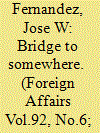

|
|
|
|
|
| Publication |
2013.
|
| Summary/Abstract |
International development has moved beyond charity. Gone are the days when the United States would just spend its seemingly bottomless largess to help less fortunate or vanquished countries, as it did after World War II. International development has reached a new, globally competitive stage, bringing with it enormous strategic and economic implications for the United States in the years ahead.
According to the Organization for Economic Cooperation and Development (OECD), the global middle class will grow from an estimated 1.8 billion people in 2009 to 4.9 billion in 2030. Nearly all of that growth will occur outside Europe and North America, from Brazil, China, and India to countries in the Middle East, North Africa, and Southeast Asia. Eighty-five percent of the growth will come in the Asia-Pacific region alone. The priorities of those countries will change along with their demographics. With more people escaping poverty, governments' focus is shifting from meeting basic needs to ensuring longer-term economic prosperity. Instead of handouts, nations are looking for investments to keep their middle classes employed. And more often than not, those investments are for infrastructure that enables and sustains growth.
|
|
|
|
|
|
|
|
|
|
|
|
|
|
|
|
| 2 |
ID:
103028
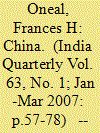

|
|
|
| 3 |
ID:
130933
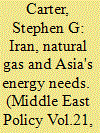

|
|
|
|
|
| Publication |
2014.
|
| Summary/Abstract |
Demand for natural gas in Asia has grown steadily during the past decade and is expected to increase considerably in the next 20 years. This growth in demand has paralleled an increasingly aggressive regime of international sanctions on Iran over its nuclear-weapons program. Considering the importance of maintaining economic pressure and political solidarity in sanctions regimes, the projected growth of demand for natural gas in some of the world's fastest-growing economies is creating both short- and long-term strategic implications for the United States and its allies. With one of the world's largest reserves of natural gas and an enviable geographical location as a likely hub for energy transit, Iran is in an excellent strategic position to benefit economically and politically from this growth in demand. While recent sanctions have dealt a damaging blow to Iran's oil exports and economy, agreement on sanctions on Iran's underdeveloped natural-gas industry has been more tepid, as nations such as Pakistan, India and China, among others, candidly weigh their options to solve increasingly dire short-term energy demand and create long-term energy security. Development of Iran's natural-gas industry to the point at which is it is able to meet demand in these nations would bring in considerable revenue for the regime, potentially enough to offset much of the economic impact of sanctions. Of particular importance to the United States and its allies, then, are answers to the following questions: Does Iran currently have the infrastructure to meet this demand? How long would it take Iran to develop the necessary infrastructure in the event nations that have expressed interest in Iran's natural gas opt against the pressure of sanctions? How likely are the above-mentioned nations to eventually contravene sanctions? How are changes in the global natural-gas industry impacting Iran's potential share of the regional and international market? And is there enough natural gas from other sources available to meet demand in nations like Pakistan, India and China?
|
|
|
|
|
|
|
|
|
|
|
|
|
|
|
|
| 4 |
ID:
123252
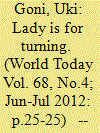

|
|
|
|
|
| Publication |
2012.
|
| Summary/Abstract |
after nine years of stability, Argentina's president is off on an economic roller-coaster ride, writes Uki Goni
|
|
|
|
|
|
|
|
|
|
|
|
|
|
|
|
| 5 |
ID:
161470


|
|
|
|
|
| Summary/Abstract |
The Kurdistan Region of Iraq (K.R.I.) experienced economic prosperity following the years of the U.S. occupation in 2003. In 2005, the region attained its semiautonomous status, and up until 2014 benefited from its constitutionally mandated share of the central budget and increased foreign investment, which came primarily from neighbouring countries. The 2014 economic downturn of the region started with the halt of transfers from the central budget, deepened with the drop of oil prices and ISIS’s occupation of Mosul, and continued with the September 2017 independence referendum. Due to the Kurdistan Regional Government’s (K.R.G.’s) reliance on Turkey’s oil pipeline for autonomous revenue, as well as on foreign companies to extract its oil and gas reserves, the region’s economic livelihood strongly depends on healthy diplomatic relations with neighbouring countries. These states, however, are directly opposed to the K.R.G.’s movement towards secession. After the independence vote, regional powers, along with Baghdad, adopted an aggressive rhetoric and implemented punitive measures towards the K.R.I., placing the economic interests of the K.R.I. at odds with its nationalistic aspirations. As the ramifications of the referendum continue to unfold, the Kurdish push for independence on a political basis subsequently threatens the K.R.I.’s economic prospects as well as the privileges that its citizens enjoyed with their semiautonomous region during the post-U.S. occupation period. Focusing on this period, this paradox is examined. The tension between independence and the economy is discussed, and avenues for synthesizing the multiple goals of the K.R.G. and its people are explored.
|
|
|
|
|
|
|
|
|
|
|
|
|
|
|
|
| 6 |
ID:
177038
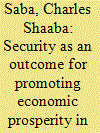

|
|
|
|
|
| Summary/Abstract |
This study investigates the impact of security outcomes on economic prosperity in Africa and its Regional Economic Communities (RECs) using a balanced panel data of 35 African countries and eight RECs for the period 1990–2015. Economic prosperity was measured with real GDP per capita as the proxy while security outcomes was computed from security effectiveness and legitimacy by using principal component analysis. This study employs a panel causality test and the Generalised Method of Moments (GMM) estimation techniques. The empirical results suggest that security outcomes promotes economic prosperity at the continental level and in six RECs. This implies that the security measures used in this study are important in providing an enabling environment for economic activities and opportunities despite the numerous security challenges facing the continent. Thus, an appropriate policy to improve and strengthen the security sector should be given priority in the RECS and across the entire continent.
|
|
|
|
|
|
|
|
|
|
|
|
|
|
|
|
| 7 |
ID:
128231
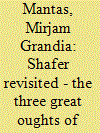

|
|
|
|
|
| Publication |
2013.
|
| Summary/Abstract |
The comprehensive approach, also known as the integrated approach, is foundational to the strategies of the Western countries operating in south Afghanistan. It builds on the same premise as the hearts and minds (HAM) theory: by providing security and basic needs to the population, support is taken away from insurgents. The assumption that a (fragile) state will be able (with support of foreign troops and organisations) to provide basic services, security, and economic prosperity, which was questioned and critiqued by Michael Schafer over two decades ago, is still part of the contemporary concept and seems to remain uncontested. The objective of this article is to test Shafer's claims about the perseverance of what he coined 'the deadly paradigms of counterinsurgency' against the British and Dutch experiences in south Afghanistan starting in 2005.
|
|
|
|
|
|
|
|
|
|
|
|
|
|
|
|
| 8 |
ID:
130938
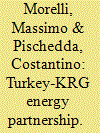

|
|
|
|
|
| Publication |
2014.
|
| Summary/Abstract |
Ten years after the U.S. invasion and two years after the complete withdrawal of American forces from its soil, Iraq faces a number of challenges to its long-term stability and development. These range from corruption to poor public services, from rising terrorist violence to ethnosectarian tensions in the context of a complex power-sharing system. An important, but often overlooked, aspect of Iraq's political scene concerns the dispute between the federal government and the Kurdish Regional Government (KRG) over the management of the country's and the Kurdish region's natural resources and over appropriate revenue-sharing mechanisms. The parties have been stuck in a costly political stalemate for the past few years, as the absence of a federal hydrocarbon law has discouraged international investment in Iraq's natural resources, and oil extracted from KRG-controlled fields has had only intermittent access to international markets.
|
|
|
|
|
|
|
|
|
|
|
|
|
|
|
|
| 9 |
ID:
119665
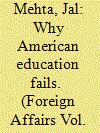

|
|
|
|
|
| Publication |
2013.
|
| Summary/Abstract |
Since the end of the industrial age, Americans have worried about improving their education system. But the country has never been able to make much progress. Other nations do it better, and the United States must learn from their examples if it hopes to catch up.
|
|
|
|
|
|
|
|
|
|
|
|
|
|
|
|
|
|
|
|
|